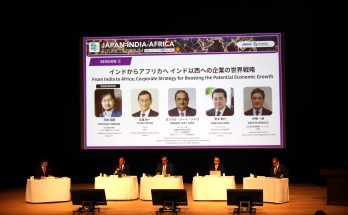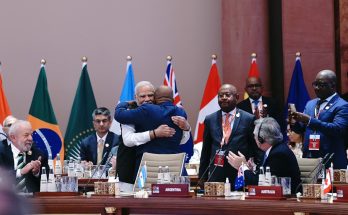
Dr. Jaishankar gave a detailed overview of the Africa-India engagement. Tracing it from the time of India’s freedom movement and Africa’s striving for liberation from colonialism and discrimination, he outlined how India’s commitment to Africa was represented by four pillars, viz., the development partnership, trade and investment, strong people-to-people ties, particularly in the areas of education and capacity building for young Africans, and, more recently, defence and maritime security. He observed that India had executed 194 developmental projects in 37 African countries, and was currently working to complete 77 additional projects in 29 countries, with a total outlay of US$ 11.6 billion – the projects ranged from infrastructure to ICT, from power generation and distribution to water and irrigation, from railways to roads, agriculture to sugar plants. He asserted that India continued to bring to Africa the best of its developmental experiences at home and that its partnership sought to empower rather than extract from local communities.
The External Affairs Minister touched upon India’s digital journey which had been a force multiplier in the delivery of education, health care and welfare benefits to Indians and how this could be of use to Africa as well: through e-Vidya Bharati and e-Arogya Bharati, premier Indian educational institutions and hospitals had been linked with 16 African countries to offer tele-education and tele-medicine services.
EAM also detailed how Indian investment had created jobs and opportunities in African countries in energy, mining, banking, textiles and other sectors, mentioning in particular India’s energy investment of about US$ 7 billion in a gas field in Mozambique as well as energy investments in South Sudan, north and west Africa. He mentioned India’s welcome to several thousand African students studying for their degrees as well as in short-term courses in a myriad subjects; the Indian-origin communities found across Africa also found mention for their contribution to the African continent’s human capital and the hospitality that Africa had offered them.
EAM ended by acknowledging that defence and security cooperation was a key 21st century pillar for India and Africa: India had helped set up Staff and Command colleges in several African countries and had trained thousands of officers and soldiers in Indian military institutions. India’s record in peacekeeping operations in Africa had been appreciated and now maritime security, including in HADR missions, was a new frontier.
The African leaders expressed their appreciation for India’s generosity in sharing COVID-related medicines and in dispatching teams of doctors to African nations. Some of the Ministers mentioned in detail the contours of specific projects in their countries that had been set up under Indian grant assistance or under concessional loans extended by the Government of India. They also spoke in warm terms of capacity-building programmes by India for their citizens.
While the African Ministers touched upon the adverse effects of the pandemic, and how it had led to the first recession in years in some of their countries, they also expressed their satisfaction at the coming into force of the African Continental Free Trade Agreement (AfCFTA) in 2019 and of their aspirations for enhanced trade, employment and investment in their countries by the establishment of a continent-wide market. EAM, in his remarks, also welcomed the coming into force of this important FTA and recalled that it had entered its operational phase following the AU Summit held in Niger in July 2019, several sessions of which had been held in the Mahatma Gandhi International Convention Centre, a state-of-the-art convention centre built under grant assistance from the Government of India.
The inaugural session was also addressed by Shri Uday Kotak, President of CII and Mr. David Rasquinha, Managing Director of EXIM Bank of India, the organisers of the Conclave. The Africa-India Conclave will be held over the next two days and will be addressed by 27 Ministers, which will be the highest number of ministerial participants it will welcome in its 15-year history.
Author Profile
- India Writes Network (www.indiawrites.org) is an emerging think tank and a media-publishing company focused on international affairs & the India Story. Centre for Global India Insights is the research arm of India Writes Network. To subscribe to India and the World, write to editor@indiawrites.org. A venture of TGII Media Private Limited, a leading media, publishing and consultancy company, IWN has carved a niche for balanced and exhaustive reporting and analysis of international affairs. Eminent personalities, politicians, diplomats, authors, strategy gurus and news-makers have contributed to India Writes Network, as also “India and the World,” a magazine focused on global affairs.
Latest entries
 India and the WorldJune 26, 2025Operation Sindoor: India Sheds Restraint, Rediscovers Utility of Force
India and the WorldJune 26, 2025Operation Sindoor: India Sheds Restraint, Rediscovers Utility of Force India and the WorldJune 23, 2025BRICS summit in Rio to focus on Global South, local currency trade
India and the WorldJune 23, 2025BRICS summit in Rio to focus on Global South, local currency trade Africa InsightsJune 11, 2025New Opportunities in India-Japan Cooperation in Africa
Africa InsightsJune 11, 2025New Opportunities in India-Japan Cooperation in Africa India and the WorldMay 23, 2025Post-Operation Sindoor, India reminds Turkey, China of concerns and sensitivities
India and the WorldMay 23, 2025Post-Operation Sindoor, India reminds Turkey, China of concerns and sensitivities







